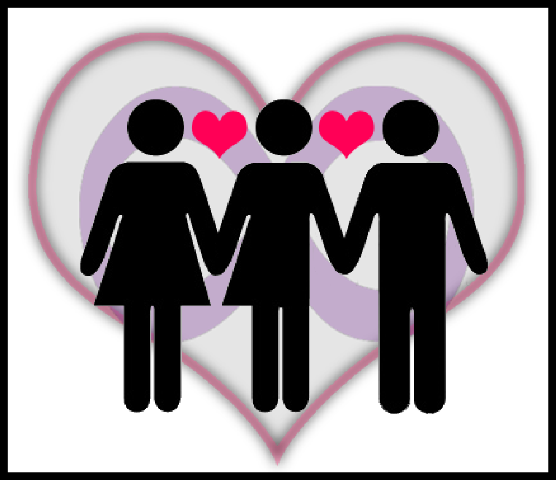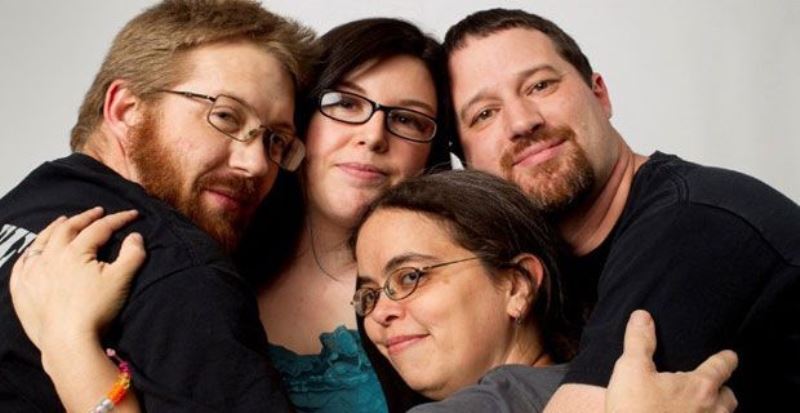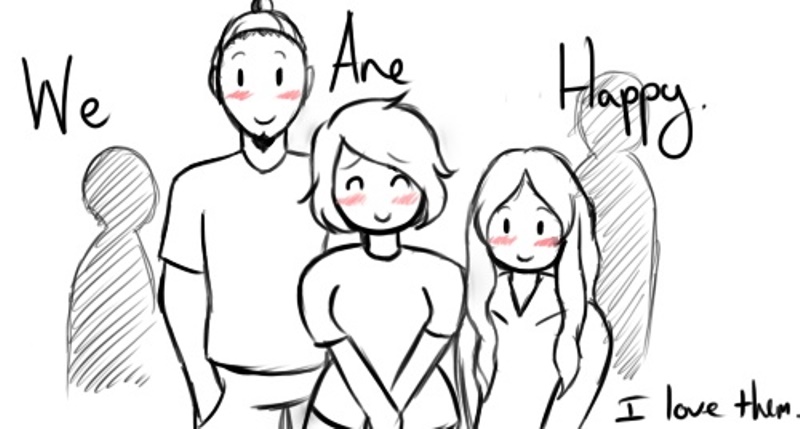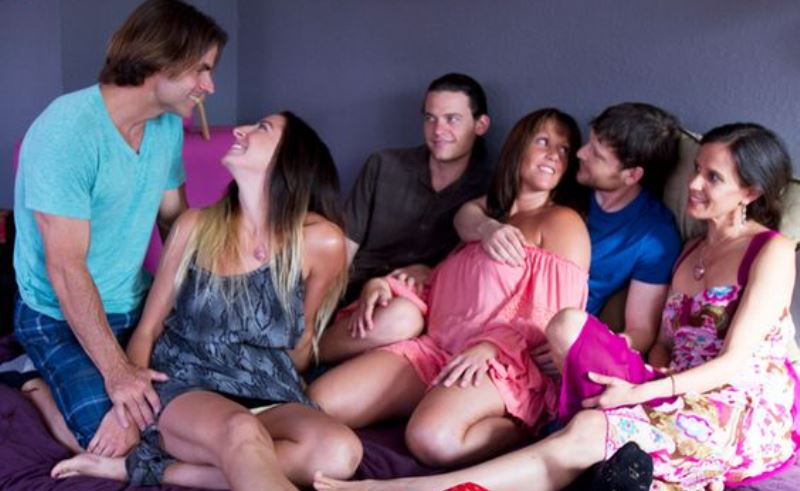“Together, is my favourite place to be.”
We have been taught in singulars, ever since we were young. A single goal, a single purpose of life, ‘one true love’: we have been socialised into spending our lives finding that single ideal. But what if I told you that your life was way too large to be contained in singulars? You exist in plural, or multiple, and as John Green once said, half of our problems would vanish if we realised ‘the one’ doesn’t exist.
Suggested read: OpenMinded.com caters to ‘ethical cheaters’ and polyamorous people
We live in perpetual fear that we aren’t doing what we’re meant to do, or being where we’re meant to be, when it is, really, more about ‘want’. Do you want to be here? Do you want to do this? You could be destined to be a footballer, and then an author, and then, perhaps, a chef too. Your destiny is limitless, and don’t let society tell you otherwise. Having established that life doesn’t speak to you in binary, that it isn’t 0 if it isn’t 1, romance too, doesn’t necessarily define a ‘couple’ as two people, and that’s what polyamorous dating is all about.

Image source: Google, copyright-free image under Creative Commons License
In the course of studying primitive societies, we see the gradual evolution of relationships from polygamy to monogamy for purely economic reasons. As resources began to deplete, and became scarce in the face of ruthless competition, the bread-earners gradually realized that a big family will cause all the members to perish. So, instead of keeping innumerable wives/husbands, they resorted to monogamy. Polygamy still existed, but was rare enough for it to be called an exception.
As monogamy has become the common practice, society has gradually developed the notion that it is the right thing to do. People are fine-tuned to believe that having more than one partner is wrong, and it somehow goes against the essence of love.
Have you ever stopped to wonder who set down these rules for romance? Religion has prescribed books for behaviour. Hindus have the Manusmriti and Bhagwad Gita, Muslims the Quran, Christians the Bible, and so on. These books make it easier (and wrongly so) for religious leaders to sometimes substantiate their claims of right or wrong in the name of religion (which in itself, is arbitrary enough) and yet, several debates have been conducted all over the world, discussing the restrictions that religion places on our personal freedom. But the societal norm of love doesn’t even have a rule book, and yet, it has never been contested, and is followed blindly!
What is polyamory?

Image source: Pinterest
Polyamory is a fairly modern concept. It’s the practice of having intimate relationships with more than one person at a time. Polyamorous dating believes that you needn’t love in singular, and that it’s far from unethical. According to 22-year-old Allison, “We have always been taught to love one person. It’s practically impossible for you to be attracted to one person for as long as you’re alive. Every time your attention wanders to a human being apart from your spouse/partner, you are forced to quit the line of thought because it’s a taboo. I think that is artificial and highly unrealistic.” Polyamory, then, in a way, lets you be real with your emotions.
You can love more than one person at the same time as long as these relationships are honest, not hidden from the other partners, and hold everybody’s consent. Polyamorous dating is based on this belief.
Clearing misconceptions about polyamory
1. Polyamory is not cheating. It is the most common misunderstanding harbored by people who are insufficiently educated on the topic. Polyamory, by no means, promotes dishonesty in the couple(s). It is a steadfast rule that you must inform your partner(s) about your new relationship, and gain their consent. There is no monopoly involved.
2. Polyamory differs from polygamy in the sense that the former allows both partners to have their own web of relationships, whereas in the latter, only either of the sexes are prolific in their mating.
3. Each relationship is equally important. Alexis, has been married to Dan for 12 years. She also has a boyfriend that Dan is aware of. “People often confuse my boyfriend with an extra-marital affair. They refuse to understand that he is as much my partner as my husband. I’d like to be able to attend weddings and Christmas parties with both of them by my side, without having the world suffer a cardiac arrest for my scandal.” As much as society loves divisions, polyamorous relationships aren’t necessarily hierarchical. Please don’t confuse Romance with the Food Chain!
Do polyamorous marriages work?
The 46 years of marriage for Don, Bob, and Keith, is a testament to the success of polyamorous marriages. Don was often away on his job as an airplane pilot, and this arrangement was found suitable for them. Bob and Keith still continue a married life, after Don’s untimely death from cancer.

Image source: Tumblr
For Michael and Kamala, their marriage is as strong as ever. However, so is Michael’s relationship with girlfriend, Rachel, whom they invited to live with them. It isn’t the first time that they have undertaken this measure in their 12 years of marriage, and Kamala has been dating a woman for two years now. Their story was featured on Showtime’s ‘Polyamory: Married and Dating’. “Monogamy can be a really beautiful agreement between people when they’re deeply in love and they don’t have desire for another,” Kamala says. “But most people in our society are just monogamous because their vows said ‘I will forsake all others.'”
Regina lives with her husband, Russell, and her boyfriend, Dave, in the same quarters. What is interesting here, though, is Regina’s 11-year-old daughter, Colleen. One of the primary functions of marriage, according to sociological analysis, is perpetuating society, or producing (and nurturing) offspring. The question of raising a child in unnatural circumstances has been presented to any couple that has defied the natural order of being, be it polyamory, homosexuality, or the transgender community. Regina says that Colleen has been brought up the way any other child is. “We’ve been open pretty much her entire life. It’s just been this gradual introduction over time, that some people think that you are only allowed to love one other person.” But they tell her it’s possible to be in love with several, and there’s nothing right or wrong about how your emotions work.
The ‘do’s and ‘do not’s of polyamory
For those of you considering polyamorous endeavors, these are uncharted waters as far as common advice columns are concerned. Here are a few pointers to help you find your way:
1. Don’t say yes to pacify: It is often seen that one submits to the choices of their partner because the other consequences (conflict or breaking up) is less desirable. Truth is, if you are not okay with the arrangement before it has even begun, it can only go downhill from there. So, save yourself the eventual break-up and voice your opinions as they are.
2. Don’t keep score: It is immature to keep comparing yourself to the other partner and determining if you’re falling short. “You slept with her two nights in a row, so, you must do the same for my end” or “you bought him two presents, you can’t just buy me one”, so forth. Love is far from a tallying game.

Image source: Pinterest
3. Don’t degrade the other partner: Remember that you’re in the very group that the other partner is in. If you seek to slander him/her so your spouse may value you more, then that’s not how it works. It will only cause conflict and make your habitat an unhealthy place to be in.
4. Adding people doesn’t solve problems: Some people use polyamory as a distraction from a broken relationship. It does nothing but complicate your already messy mental state. Please do not venture into polyamorous liaisons to solve your problems, because chances are, they will cause larger issues.
5. Be flexible: It is undeniable that polyamorous relationships follow a more complex form than any other, simply because they involve so many people. Be a little relaxed in your demands and understand that your partner cannot be in two (or more) places at the same time.
Suggested read: 8 definite signs to help you figure out if you’re dating a cheater
There is a severe hush-hush blanketing polyamory. The rigid beliefs of society will take an eternity to change which is why we wish to start with you. The very fact that MS Word keeps changing ‘polyamory’ to ‘polygamy’ and puts a red underline every time I change it back, is simply baffling. Here we have a phenomenon that several people in the world are happily adhering to, but society continues to pretend like it’s a joke, or at most, a phase that will pass. Ellie, a 24-year-old Mass Communication graduate, says, “You have the LGBT community, and the Transgender community all fighting for the right to love in their own way. There are several people who support them in their strife, but these very people also believe that polyamory is a form of cheating or ‘mindless fun’.” The sad part is several people misuse the tag of polyamory to exactly these ends.
We refuse to take a right or wrong stand on the topic, simply because it isn’t our place to. Love, we all agree, is an absolutely beautiful emotion, and how you fall in love, and who or how many you choose to love, is frankly none of our business. This article was aimed at providing an empirical analysis of the modern phenomenon of polyamory, and we wish to conclude with a request: In a world of 7 billion people, each of us define ‘love’ differently. If you don’t like my perspective, pass it by, but please, let it exist.
Let us know your thoughts on whether or not polyamorous relationships work? Sound off in the comments below!
Featured image source: Pinterest











